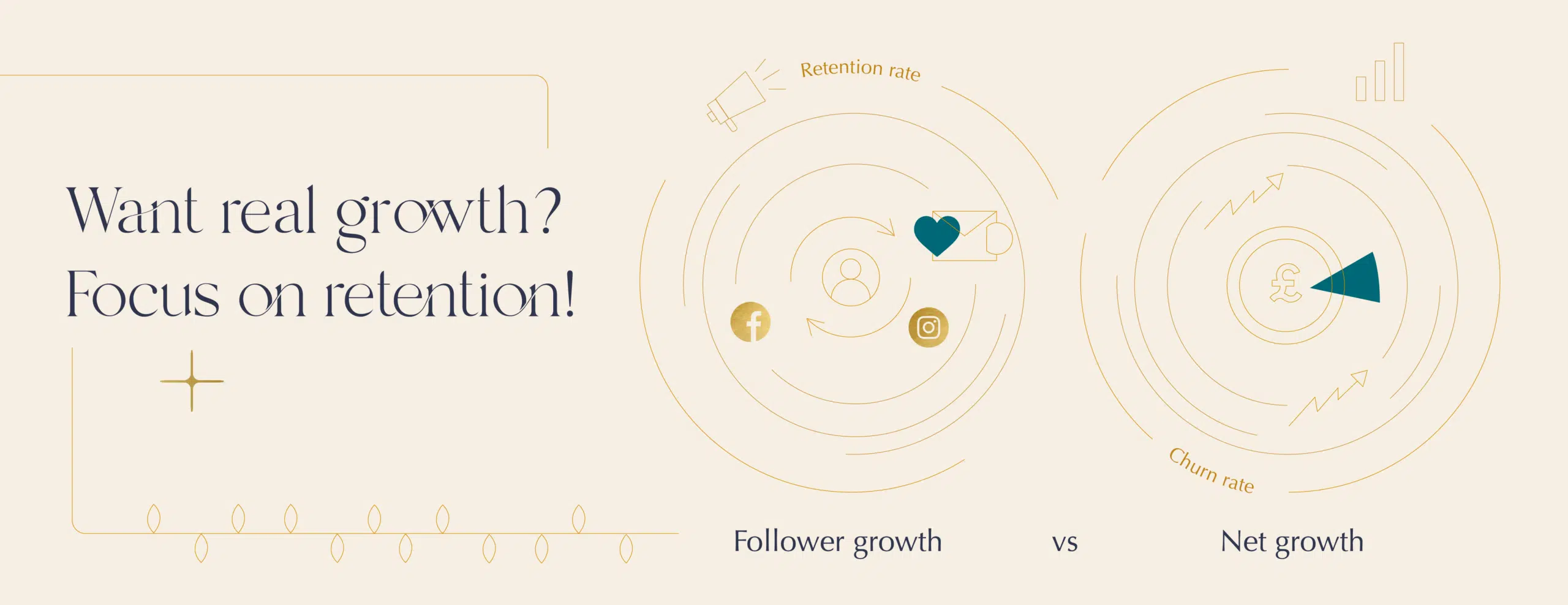
The Difference Between Growth in Followers and Net Growth
Many brands focus heavily on one goal: increasing their follower count. It’s a metric that’s easy to track, report, and celebrate. However, there’s an important distinction between simply increasing followers and achieving a net increase in followers. The real success isn’t just in gaining new followers—it’s in retaining them and maintaining steady, long-term engagement.
Why Retention Matters More Than You Think
While gaining new followers is important, focusing solely on this number can lead to a misleading sense of success. Here’s why retention is the true measure of growth:
Retained followers, especially those who have been with a brand for a longer period, are more likely to engage with content. This engagement is essential for boosting visibility and reaching new audiences. In fact, studies show that engaged followers are up to 7 times more likely to make a purchase than those who follow a brand but don’t interact with its content.
The time, money, and effort spent attracting new followers should ideally result in long-term value. According to a study by Bain & Company, a 5% increase in customer retention can lead to an increase in profits by 25% to 95%. Retaining followers means that brands get more value from their marketing investments over time, rather than constantly having to replace lost followers.
Followers who stick around and engage with a brand over the long term often become advocates. Research from Nielsen shows that 92% of consumers trust recommendations from friends and family more than advertising. Loyal followers who become advocates can drive organic growth in ways that advertising alone cannot.
How to Retain Followers and Maximise Net Growth
One of the main reasons people unfollow brands is inconsistent or irrelevant content. To retain followers, it’s crucial to post regularly and provide value in every post. This can include educational content, entertainment, behind-the-scenes insights, or anything that resonates with your audience. The key is to understand what your followers want and consistently deliver it.
Engaging with your audience is more than just responding to comments—it’s about making your followers feel heard and valued. Brands that actively interact with their community by replying to comments, resharing user-generated content, and participating in conversations are more likely to retain followers. A study by Sprout Social found that 64% of consumers want brands to connect with them, and this connection can significantly boost retention.
Rewarding followers with exclusive content, discounts, or perks is a great way to encourage them to stay. People are more likely to remain loyal to a brand that offers them value in return. Whether it’s early access to new products, members-only content, or special deals, providing these incentives can enhance loyalty and reduce unfollows.
With the abundance of content available online, personalisation is key to standing out. According to Epsilon, 80% of consumers are more likely to make a purchase when brands offer personalised experiences. By tailoring your messaging, offers, and content to specific audience segments, you can keep your followers engaged and prevent them from losing interest.
To improve retention, it’s essential to understand why people are unfollowing. Social media analytics tools can help identify patterns or specific types of content that lead to unfollows. By analysing these trends, you can adjust your strategy to address any issues and retain more followers in the future.
Overall, while it’s easy to focus on the number of new followers as a measure of success, sustainable growth depends on retaining those followers over the long term. Brands that prioritise retention by consistently providing value, engaging with their audience, and understanding their followers’ needs are more likely to achieve meaningful net growth.
By shifting the focus from simply increasing followers to cultivating a loyal, engaged community, brands can ensure that their growth efforts result in lasting success.

